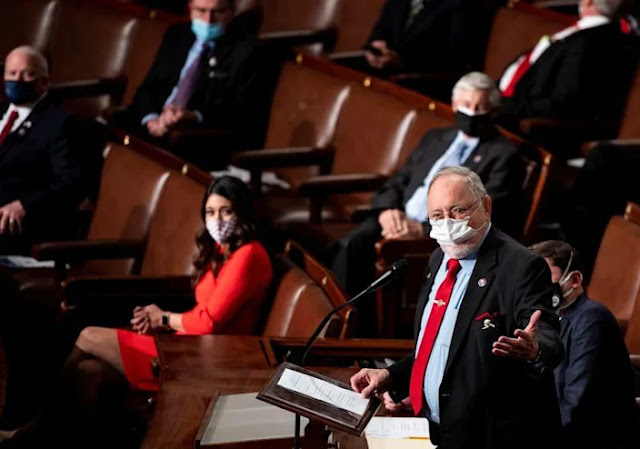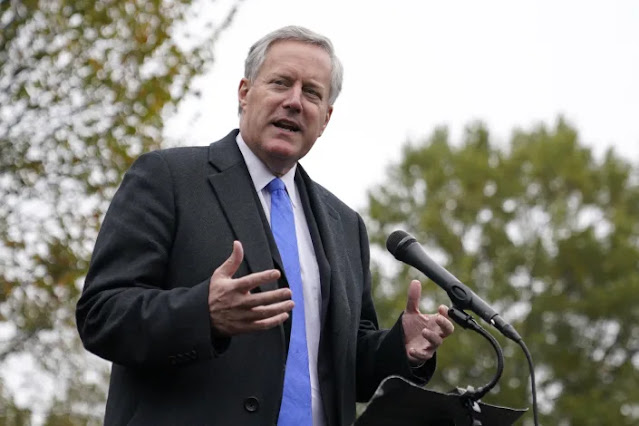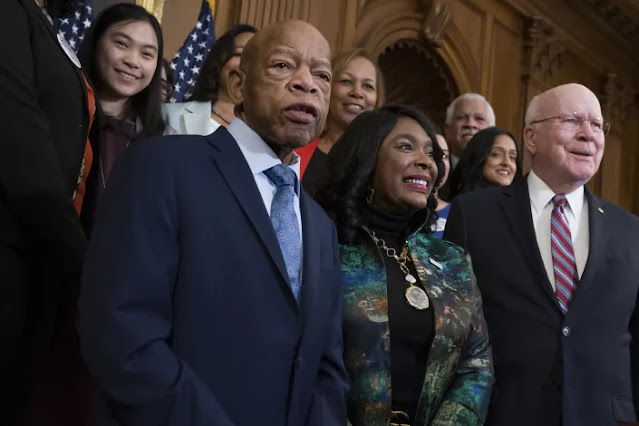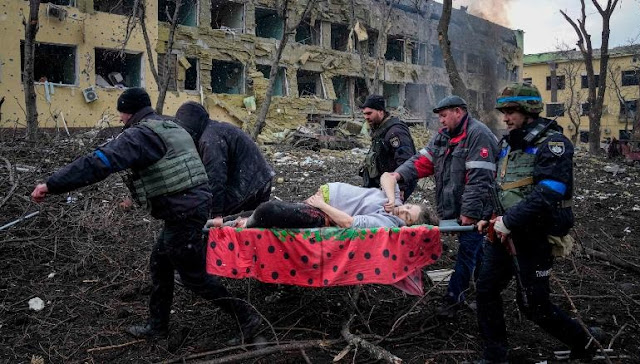Russia's military goals in Ukraine have been hazy since it began its invasion more than a month ago, and new statements suggest Moscow may consider claiming victory without completely overthrowing the Ukrainian government or capturing Kyiv.
Western analysts and leaders were skeptical of the Friday statements, where the deputy chief of the Russian general staff said his forces had largely achieved the "main objectives" of a first phase of the conflict. The power of the Ukrainian military has been "considerably reduced," freeing up troops to "focus on the main efforts to achieve the main goal, liberation of Donbas," said Col. Gen. Sergei Rudskoi.
The implications of the statement are difficult to determine, according to Stephen Biddle, a professor of international and public affairs at Columbia University who has studied U.S. wars in Iraq, Afghanistan and elsewhere.
"It's plausible that they’re basically trying to ratchet their perceived war aims down to something they’ve already accomplished," he said.
The pronouncement of shifting goals comes as President Joe Biden is in Warsaw Saturday to confer with Polish President Andrzej Duda, meet Ukrainian refugees in Warsaw and deliver what the White House is billing as a major speech before he departs for the U.S.
Before the invasion, portions of the Donbas in southeastern Ukraine were already controlled by Russian-backed forces.
Similarly skeptical, French President Emmanuel Macron said “it’s too soon to say” whether the Russians have changed their approach.
But what does appear clear: In the face of fierce Ukrainian resistance, the progress of Russian forces has largely stalled. Kyiv — while battered — remains under the control of the Ukrainian government.
Meanwhile, the humanitarian crisis caused by the war continues. A Russian airstrike last week on a Mariupol theater that was being used as a shelter killed about 300 people, Ukrainian authorities said Friday. That would make it the deadliest known attack on civilians in the war yet.
Latest developments
►President Joe Biden, who is in Warsaw, on Friday expressed support for Poland's efforts in helping Ukrainian refugees. More than 2 million Ukrainians have fled to Poland since the start of Russia’s invasion of their country.
►The U.N. human rights office said it has been challenging to confirm fatalities in Mariupol given the organization's strict methodology for counting the number of civilian deaths in conflict. The office says at least 1,035 civilians have been killed in Ukraine and 1,650 injured, but acknowledges that is an undercount.
► The governor of the Kyiv region says that Russian forces have entered the city of Slavutych in northern Ukraine and seized a hospital there.
Biden arrives for meeting with Duda
With pomp and fanfare, President Joe Biden arrived at the Presidential Palace in Warsaw on Saturday for a meeting with Polish President Andrzej Duda on how allies are responding to the humanitarian crisis sparked by the war in Ukraine.
Biden’s limousine pulled into the palace courtyard shortly after 12:30 p.m. local time.
Duda greeted the president as he stepped out of the car. The two chatted briefly, shook hands with a line of dignitaries and then participated in a formal arrival ceremony that included the playing of each country’s national anthem and a military procession.
– Michael Collins
Russian troops enter city of Slavutych, seize hospital
LVIV, Ukraine -- The governor of the Kyiv region says that Russian forces have entered the city of Slavutych and seized a hospital there.
Slavutych is located north of Kyiv and west of Chernihiv, outside the exclusion zone that was established around the Chernobyl nuclear power plant after the 1986 disaster. It is home to workers at the Chernobyl site.
Governor Oleksandr Pavlyuk said Saturday that the Russians also kidnapped the city’s mayor, but some media reported later in the day that the mayor was released swiftly. Neither claim could be verified independently .
The governor said that residents of Slavutych took to the streets with Ukrainian flags to protest the Russian invasion.
“The Russians opened fire into the air. They threw flash-bang grenades into the crowd. But the residents did not disperse, on the contrary, more of them showed up,” Pavlyuk said.
- Associated Press
Death toll of children reaches 136
In the month since the Russian invasion began, 136 children have been killed.
Reuters reported that 64 of the children were killed in the Kyiv region and 50 were killed in the Donetsk region. An additional 199 children have been wounded.
The Office of the UN High Commissioner for Human rights said Thursday, the civilian death toll in Ukraine has exceeded 1,000 since the start of the war.
- Ana Faguy
Top Ukrainian officials to attend Biden speech in Warsaw
A pair of top Ukrainian officials will be on hand in Warsaw Saturday when President Joe Biden delivers a speech on holding Russia accountable for its month-long war against Ukraine.
Ukrainian Defense Minister Oleksii Reznikov said in a message on Twitter that he and Ukrainian Foreign Minister Dmytro Kuleba will attend the president’s address.
Biden started the final day of his four-day trip to Europe by dropping by a meeting between Reznikov and Kuleba and their U.S. counterparts – Secretary of State Antony Blinken and Defense Secretary Lloyd Austin. Reznikov tweeted a photo of the meeting – sans Biden – and said they were discussing “current issues & cooperation in political & defense directions.”
“In the evening we’ll also be present at @POTUS speech on the Russian war against Ukraine,” Reznikov wrote.
Biden will deliver his remarks at the Royal Castle in Warsaw.
– Michael Collins
100,000-plus flee Ukraine on Friday
More than 100,00 people left Ukraine Friday, the State Border Guard Service Ukraine said.
Two-thirds of those who left crossed Ukraine's western borders with EU countries as well as Moldova. The State Border Guard Service estimated 45,000 left Friday night alone.
Meanwhile, many men are returning to Ukraine to defend the country, the Ukrainian government said. 21,000 people arrived in Ukraine Friday night. The State Border Guard Service said more than 420,000 Ukrainians have returned since Russia first invaded.
The United Nations estimates that 10 million people have fled Ukraine since the conflict began last month. Friday's flow of refugees was significantly higher than in recent days. On Wednesday, about 43,000 fled and around 62,000 fled Thursday, according to government figures.
- Ana Faguy
Ukraine president Zelenskyy makes surprise appearance at Doha Forum
DOHA, Qatar — Ukraine's president made a surprise video appearance Saturday at Qatar's Doha Forum, calling on the energy-rich nation and others to boost their production to counteract the loss of Russian energy supplies.
Volodymyr Zelenskyy called on the United Nations and world powers to come to his aid, as he has in a series of other addresses given around the world since the start of the war Feb. 24. He compared Russia's destruction of the port city of Mariupol to the Syrian and Russian destruction wrought on the city of Aleppo in the Syrian war.
"They are destroying our ports," Zelenskyy said. "The absence of exports from Ukraine will deal a blow to countries worldwide."
The loss of Ukrainian wheat already has worried Mideast nations like Egypt, which relies on those exports.
Zelenskyy called on countries to increase their exports of energy — something particularly important as Qatar is a world leader in the export of natural gas.
Zelenskyy criticized Russia for what he described as threatening the world with its nuclear weapons, raising the possibility of tactical nuclear weapons being used on the battlefield.
"Russia is deliberating bragging they can destroy with nuclear weapons, not only a certain country but the entire planet," Zelenskyy said.
He also noted that Muslims in Ukraine would have to fight during the upcoming holy fasting month of Ramadan.
"We have to ensure this sacred month of Ramadan is not overshadowed by the misery of people in Ukraine," he said.
– Associated Press
President Biden to meet with refugees, deliver speech
President Joe Biden on Saturday will cap his European trip talking to Ukrainian refugees in Poland and delivering a speech on holding Russia accountable for its invasion and upholding democratic values.
Jake Sullivan, Biden’s national security adviser, previewed Biden’s remarks as a major address that will “speak to the stakes of this moment, the urgency of the challenge that lies ahead, what the conflict in Ukraine means for the world, and why it is so important that the free world sustain unity and resolve in the face of Russian aggression.”
Biden will also put the war in historical context and describe where he sees it going from here, Sullivan said.
Before delivering those remarks at the Royal Castle in Warsaw, Biden will meet with Polish President Andrzej Duda at the Presidential Palace
“The suffering that is taking place now is at your doorstep,” Biden told Duda on Friday at a meeting in Rzeszów, where the influx of refugees is the largest. “You're the ones who are risking, in some cases, your lives and risking all you know to try to help. And the American people are proud to support your efforts.”
On Thursday, Biden announced the U.S. will take in up to 100,000 Ukrainians and provide more than $1 billion in humanitarian assistance.
Poland has taken in more than 2 million refugees, and the numbers continue to grow.
“We have never experienced anything like that throughout our history,” Duda told Biden.
On Saturday, Biden will meet with refugees at the National Stadium in Warsaw. The stadium is a processing center where refugees are issued identification cards allowing them to work, live, go to school and get social benefits.
“I'm here in Poland to see firsthand the humanitarian crisis,” Biden said Friday, expressing his disappointment that he can’t cross the border into Ukraine for security reasons.
Biden has been in Europe since Wednesday, meeting with NATO allies and other European and world leaders.
The U.S. and its allies announced new sanctions on Russia, additional help for Ukraine, and discussed beefing up force presence in Eastern Europe in the near and longer-term.
– Maureen Groppe
UK sees Russians reluctant to enter urban war
LONDON — Britain's Defense Ministry says Russia continues to besiege a number of major Ukrainian cities including Kharkiv, Chernihiv and Mariupol.
A daily update says Russian forces are proving reluctant to engage in large scale urban infantry operations, rather preferring to rely on the indiscriminate use of air and artillery bombardments in an attempt to demoralize defending forces.
The assessment says it is likely Russia will continue to use its heavy firepower on urban areas as it looks to limit its own already considerable losses, at the cost of further civilian casualties.
– Associated Press
Zelenskyy: Ukraine will not cede territory to end Russian invasion
Zelenskyy has again appealed to Russia to negotiate an end to the war, but says Ukraine would not agree to give up any of its territory for the sake of peace.
In his nightly video address to the nation Friday, Zelenskyy appeared to be responding to Col. Gen Sergei Rudskoi, deputy chief of the Russian general staff, who said Russian forces would now focus on “the main goal, the liberation of Donbas.”
Russian-backed separatists have controlled part of the Donbas region of eastern Ukraine since 2014, and Russian forces have been battling to seize more of the region from Ukraine, including the besieged city of Mariupol.
Rudskoi’s statement also was a suggestion that Russia may be backing away from trying to take Kyiv and other major cities where its offensive has stalled. Zelenskyy noted that Russian forces have lost thousands of troops but still haven’t been able to take Kyiv or Kharkiv, the second-largest city.
Ukraine destroys Russian vessel; Moscow taps troops in Georgia
Ukrainian forces destroyed a Russian transport ship in the port city of Berdyansk that appeared to be on a resupply mission, a senior Defense official said Friday.
The attack on Thursday blew up a tank-landing ship at its pier, said the official who spoke on condition of anonymity to discuss intelligence assessments. The Russians have 22 warships in the Black Sea.
Russian combat power in Ukraine, which dipped below 90% for the first time this week, is now between 85% and 90%, the official said. For the first time, Russia appears to be drawing reinforcements from its troops based in Georgia. Combat power includes troops, tanks, armored vehicles, artillery, warplanes, warships and ballistic missiles.
Russia has also drawn down its stockpile of precision-guided weapons and is relying more on so-called dumb bombs to bombard cities, the official said. Russia has used about 50% of its air-launched cruise missiles. Russia’s cruise missiles have at times failed to launch or hit their targets.
– Tom Vanden Brook
Poll shows Americans support Russian sanctions, think Biden should be tougher
A majority of Americans are supportive of the harsh sanctions on Russia but believe Biden needs to be tougher on the Kremlin after its invasion of Ukraine, according to a poll commissioned by the Associated Press and NORC released Thursday.
The poll, which surveyed 1,082 U.S. adults from Thursday to Monday, found 56% of Americans believe Biden's response to Russia hasn't been tough enough, including a majority of 53% of Democrats. A very small percent, about 6%, said they thought Biden had been "too tough," the poll shows.
Across the board, Americans of both political parties were supportive of the harsh economic blows to Russia. The poll showed 68% were supportive of economic sanctions in general with 70% saying they supported the recent banning of oil imported from Russia, which in turn caused gas prices to rise.
— Christal Hayes
















